WELCOME TO THE ARCHIVE (1994-2014) OF THE MAQUILA SOLIDARITY NETWORK. For current information on our ongoing work on the living wage, women's labour rights, freedom of association, corporate accountability and Bangladesh fire and safety, please visit our new website, launched in October, 2015: www.maquilasolidarity.org
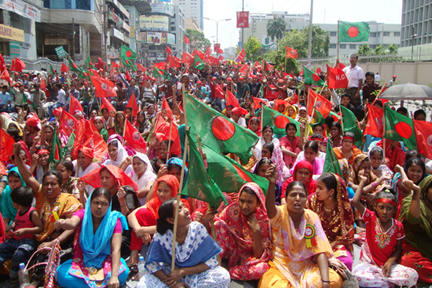
The Maquila Solidarity Network, together with our international allies including the Clean Clothes Campaign (CCC), the International Labour Rights Forum (ILRF), Workers Rights Consortium and the International Textile, Garment and Leather Workers' Federation (ITGLWF now IndustriALL) have regularly called attention to the need for structural measures to end the consistent and ongoing worker rights violations in the Bangladeshi garment industry.
Together with unions and NGOs in Bangladesh, we called upon brands and retailers, the Bangladeshi government, factory owners and their associations to take immediate action to eliminate worker rights violations and and fire and safety hazards.
In Canada, we urged all Canadian retailers sourcing clothes from Bangladesh to work together with US and European retailers and brands, Bangladeshi manufacturers and their industry associations, the Bangladeshi government, and local and international trade union and nongovernmental organizations to tackle the root causes of continuing worker rights violations in the industry.
Below are some examples of our work:
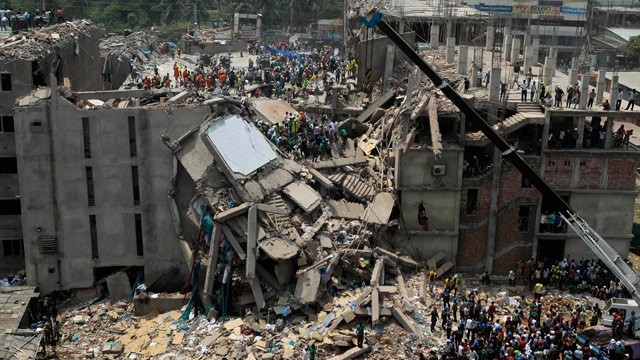 As we near the end of 2014, the Accord on Fire and Building Safety in Bangladesh reports that it has completed safety inspections in 1,100 apparel factories covered by the Accord, and more than 500 corrective action plans have been approved to date. The inspections are overseen by Brad Loewen, a fire inspection engineer formerly employed by the City of Winnipeg, Canada.
As we near the end of 2014, the Accord on Fire and Building Safety in Bangladesh reports that it has completed safety inspections in 1,100 apparel factories covered by the Accord, and more than 500 corrective action plans have been approved to date. The inspections are overseen by Brad Loewen, a fire inspection engineer formerly employed by the City of Winnipeg, Canada.
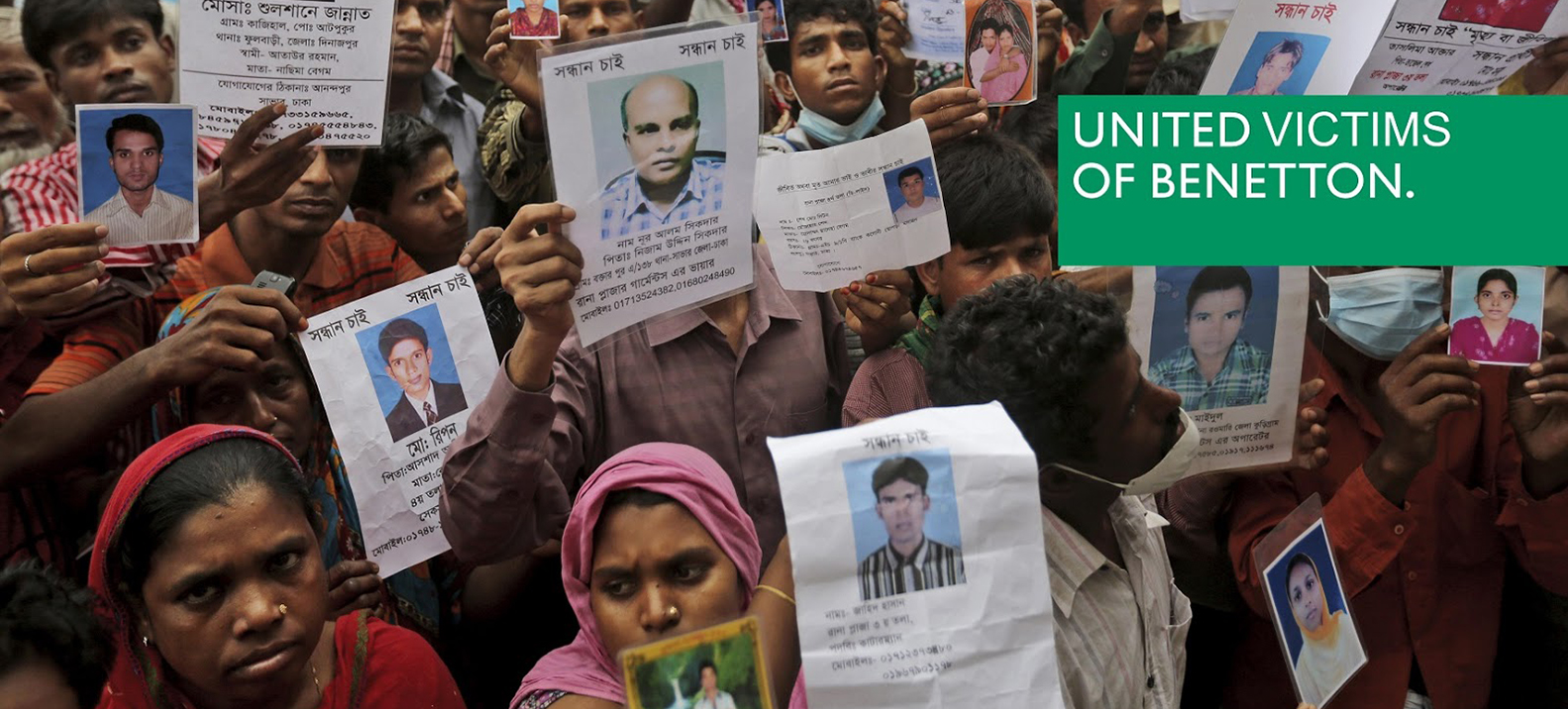 On November 24, the second anniversary of the Tazreen factory fire in Bangladesh, the Clean Clothes Campaign (CCC) and the Global Union IndustriALL announced that they had reached agreement with the European retailer C&A on a system for delivering long-term compensation to the families of the 120 workers killed and the 300 workers seriously injured.
On November 24, the second anniversary of the Tazreen factory fire in Bangladesh, the Clean Clothes Campaign (CCC) and the Global Union IndustriALL announced that they had reached agreement with the European retailer C&A on a system for delivering long-term compensation to the families of the 120 workers killed and the 300 workers seriously injured.
Over fifty human rights, religious, international development, trade union, women’s, teacher, student, community and investor organizations have released an Open Letter calling on the Canadian government to publicly urge Canadian companies whose apparel products are made in Bangladesh to contribute generously to a trust fund for the approximately 2,500 workers injured and the families of over 1,100 workers killed in the Rana Plaza building collapse.
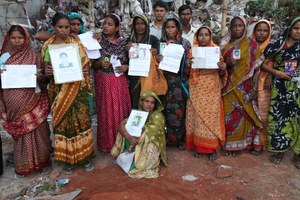 April 24th marked the one-year anniversary of one of the most devastating industry tragedies in history. Yet, despite global outrage at the number of unnecessary worker deaths and injuries suffered as a result of this preventable disaster, most of the survivors and families of those killed are still waiting for just compensation.
April 24th marked the one-year anniversary of one of the most devastating industry tragedies in history. Yet, despite global outrage at the number of unnecessary worker deaths and injuries suffered as a result of this preventable disaster, most of the survivors and families of those killed are still waiting for just compensation.
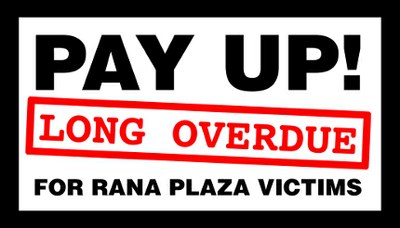
March 24: One month before the one-year anniversary of the Rana Plaza building collapse, the survivors and families of those killed can finally register claims for compensation with the Rana Plaza Trust Fund which would entitle them to an advance payment toward their claim by April 24.
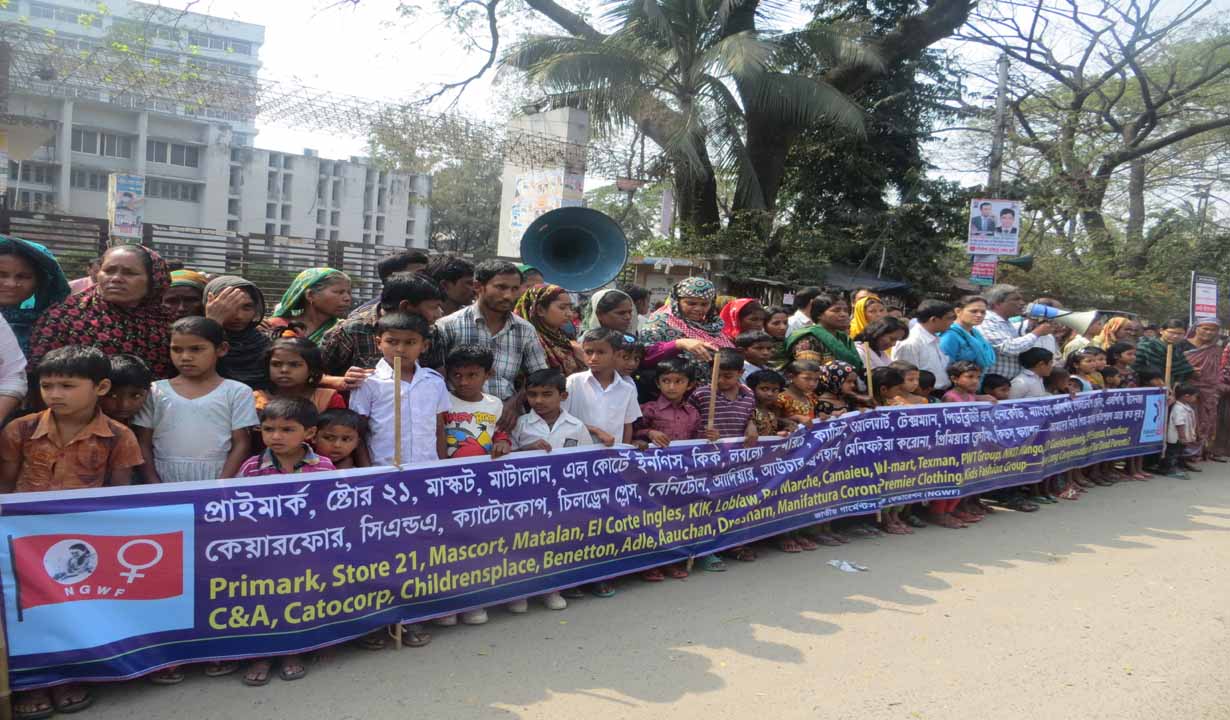 On February 24, 10 months after the Rana Plaza building collapse in Bangladesh killed over 1,100 garment workers and injured over 2,000 more, 70 trade unions and other civil society organizations released a joint statement calling on all companies whose products are made in Bangladesh to Pay Up by contributing to the Donor Trust Fund for the Rana Plaza victims.
On February 24, 10 months after the Rana Plaza building collapse in Bangladesh killed over 1,100 garment workers and injured over 2,000 more, 70 trade unions and other civil society organizations released a joint statement calling on all companies whose products are made in Bangladesh to Pay Up by contributing to the Donor Trust Fund for the Rana Plaza victims.
Signatories to the joint statement include 22 Canadian organizations, 30 Bangladeshi groups, the Global Unions IndustriALL and UNI, and organizations from across Asia, Europe and in the United States. To date, only seven companies, including Canada’s Loblaw, have publicly committed financial contributions to the Rana Plaza Donors Trust Fund.
 (Photo: National Garment Workers Federation October, 2013)
(Photo: National Garment Workers Federation October, 2013)
Twenty-five human rights, faith, women's, teacher, student, community, overseas development and trade union organizations have signed an Open Letter calling on Canadian retailers and brands to sign the Accord on Fire and Building Safety in Bangladesh. To date, only one Canadian company, Loblaw (owner of Joe Fresh), has signed the Accord.
The companies to which the letter has been sent - Canadian Tire (owner of Mark's and Sport Chek), Giant Tiger, Hudson's Bay Company, Sears Canada, Walmart, YM Inc. (owner of Suzy Shier, Stitches, Bluenotes, Urban Planet, Sirens) - have so far refused to sign the legally-binding Accord. Instead, they have joined a voluntary, company-controlled initiative, the Alliance for Bangladesh Worker Safety.
Twenty-five human rights, faith, women's, teacher, student, community, overseas development and trade union organizations have signed an Open Letter calling on Canadian retailers and brands to sign the Accord on Fire and Building Safety in Bangladesh. To date, only one Canadian company, Loblaw (owner of Joe Fresh), has signed the Accord.
One year after the Tazreen factory fire and seven months after the Rana Plaza disaster the survivors and families of those who died are still waiting for justice.